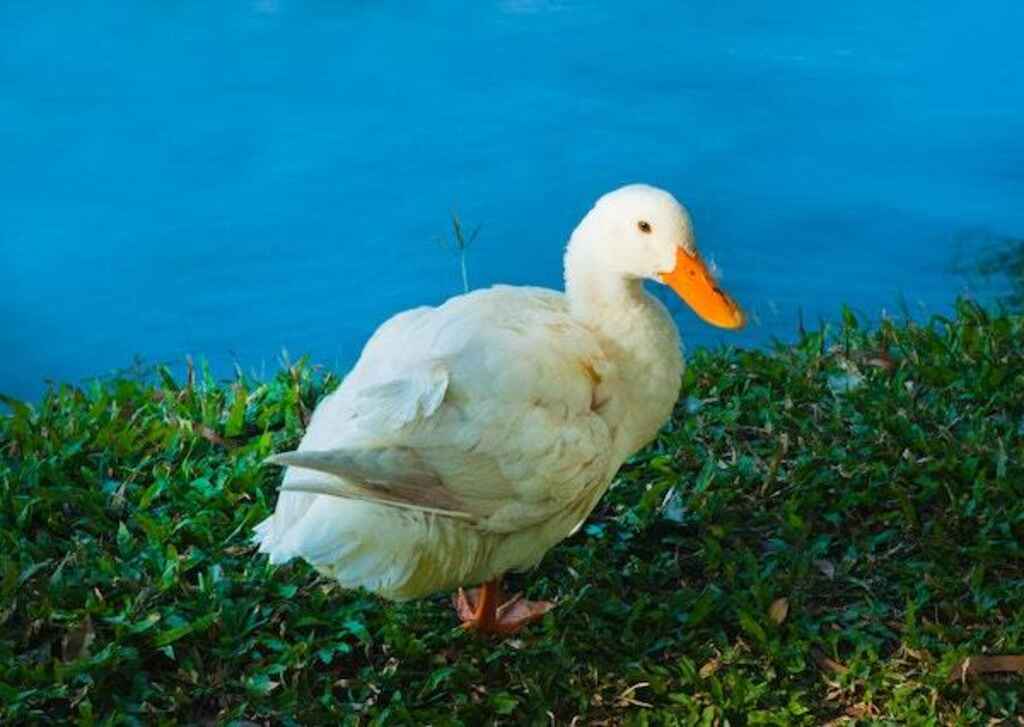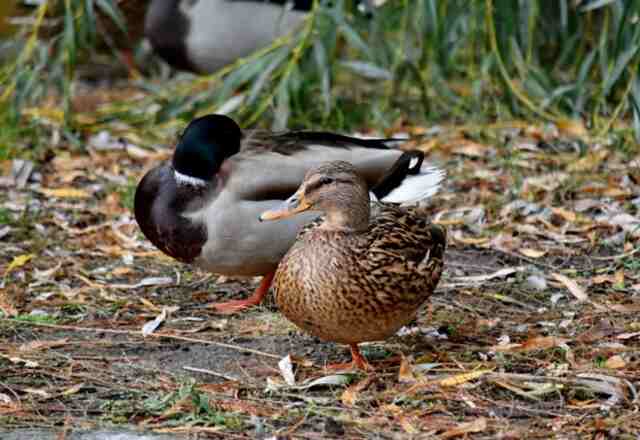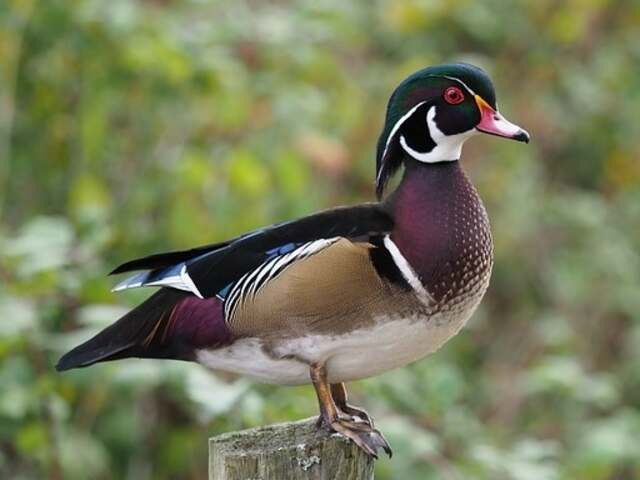Ducks are delightful creatures. They have a quirky personality, distinct physical features, and they make cute quacking noises. But when you own or work with ducks, there’s one aspect of their behavior that can’t be ignored – their poop!
Duck poop is a constant presence that can pile up quickly if not managed properly. So, how often do ducks poop? And why is it important to know?
Table of Contents
- 1 Duck Poop Frequency
- 2 How often do ducks poop?
- 3 What does duck poop look like?
- 4 Why is duck poop important?
- 5 Tips for Managing Duck Waste
- 6 Fun Facts about Ducks and their Poop
- 7 Conclusion: Cleaning up Duck Poop, One Quack at a Time
- 8 FAQs: How Often Do Ducks Poop?
- 8.1 How often do ducks poop?
- 8.2 Is duck poop harmful?
- 8.3 How do I clean up duck poop?
- 8.4 Can I use duck poop as fertilizer?
- 8.5 How can I prevent ducks from pooping on my property?
- 8.6 How can I train my ducks to poop in a specific area?
- 8.7 How do I know if my ducks are healthy based on their poop?
- 8.8 Can ducks get sick from their own poop?
- 8.9 How do I keep my pond clean from duck poop?
- 8.10 Can I eat duck eggs if the ducks are pooping in the same area?
- 9 Author
Duck Poop Frequency
Ducks are known for their prodigious output of fecal matter. On average, a single duck can produce up to 0.5 pounds of waste per day – that’s half the bird’s body weight!
This means that if you have a flock of ten ducks, they could potentially generate 5 pounds of poop every day.
Multiply this by weeks or months, and you’ll realize how quickly your backyard or pond area can become inundated with waste.
Understanding duck poop frequency is essential for several reasons. Firstly, prioritizing the health and well-being of your feathered friends is crucial.
Changes in the frequency or appearance of droppings may indicate underlying health issues such as infection or malnutrition.
Secondly, managing duck waste prevents environmental contamination and reduces foul odors that can attract pests like flies and rats.
Duck manure has high nutrient content and can be used as organic fertilizer in gardening and farming applications.
However, too much accumulation of excrement in confined areas such as coops or pens can pose risks to both human health and animal welfare due to ammonia production, which is toxic at high levels.
Simply put, comprehending the frequency of duck droppings is crucial for anyone involved with these magnificent birds.
Whether you’re a duck enthusiast rearing them for eggs or meat, an agricultural professional overseeing large-scale flocks, or an ecologist studying waterfowl in their natural environments, this knowledge is invaluable.
So now we’ve established the importance of duck poop frequency, let’s dive into the specifics – how often do ducks really poop?
How often do ducks poop?
Understanding the frequency of duck poop
If you’re a new duck owner or simply curious about these waterfowl creatures, one of the questions that may cross your mind is how often they poop. On average, ducks defecate anywhere between 5-15 times per day.
Nonetheless, several factors can influence this outcome. One of the main factors that affect the frequency of duck poop is their diet.
Ducks that consume a diet high in fiber and moisture will generally produce more frequent and larger droppings. Likewise, ducks fed a commercial feed may not produce as much waste due to it being highly processed.
Age also plays a significant role in how often ducks defecate. Younger ducks tend to have smaller digestive systems and produce less waste than adult ducks.
As they mature and consume more food, their digestive system expands, leading to an increase in fecal output. Another factor that affects the frequency of duck poop is their level of activity.
Ducks that are constantly active or moving around will typically have a higher metabolism rate, which leads to more frequent defecation.
Conversely, when ducks are sleeping or resting for long periods, they may produce less waste.
Factors influencing diarrhea in ducks
While it’s normal for most ducks to defecate several times a day, some may experience diarrhea-like symptoms at certain points, which lead to more frequent bowel movements.
One factor that can result in diarrhea-like symptoms is diet-related issues, such as nutritional imbalances or feeding them foods they are not used to eating.
Another possible cause is bacterial infections from dirty water or contaminated food.
Stressful conditions such as overcrowding can also lead to diarrhea-like symptoms in some cases since it negatively affects their digestive system.
Parasitic worms are another potential cause of diarrhea in ducks, since these organisms can interfere with their digestive health and result in more frequent defecation.
If you suspect your ducks are suffering from any of these conditions, it’s important to get them checked by a veterinarian as soon as possible.
How to monitor the frequency of duck poop
It can be challenging to monitor the frequency of duck poop if you have several ducks on a farm or backyard.
However, it’s essential to keep an eye out for any abnormal changes in bowel movement patterns.
One way to do this is by observing your ducks’ natural behavior when they’re outside and looking for their droppings throughout the day.
This will allow you to gauge how often they defecate and track any changes over time.
Additionally, regularly cleaning their coop or living area can help you monitor their fecal output since it gives you an opportunity to inspect their droppings for signs of potential health issues such as diarrhea or worm infestation.
The final word
The frequency of duck poop varies depending on several factors such as diet, age, and activity level.
While most ducks typically defecate between 5–15 times daily, certain conditions such as nutritional imbalances and stress may cause diarrhea-like symptoms that lead to more frequent bowel movements.
As a duck owner or someone who works with ducks regularly, it’s crucial to keep an eye out for any abnormal changes in bowel movement patterns and take appropriate action if necessary.
This can contribute to your birds’ overall well-being and happiness throughout their lifespan.
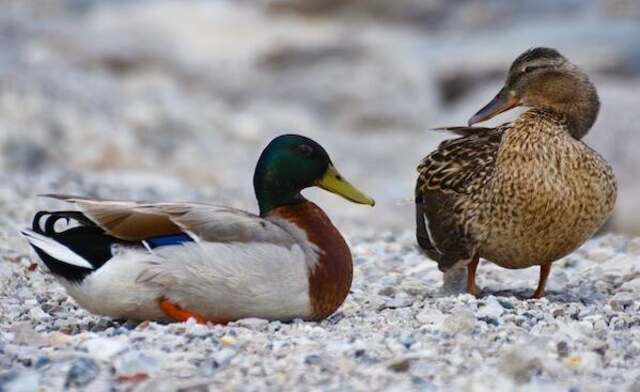
What does duck poop look like?
As a duck owner or someone who works with ducks, it is essential to know what their poop looks like.
Duck droppings are easy to identify as they typically resemble small piles of brown-greenish colored pellets.
The color and consistency of the feces will vary depending on several factors, including the bird’s diet, age, and overall health.
In terms of texture, duck poop is slightly wet and gooey. It can be sticky when it’s fresh but tends to dry out quickly.
One thing you may notice is that each pellet has a white cap on top that indicates the uric acid in their waste. You may see some feathers or undigested food in some droppings too.
The Appearance and Texture of Typical Duck Droppings
The color of duck poop can tell you a lot about your bird’s health. Greenish-brown droppings are usually healthy for ducks, as they represent normal digestive functioning.
If you notice any changes in color or texture, it could indicate an underlying problem, such as illness or even parasites.
Yellowish-white droppings are not usual for ducks, but may happen occasionally due to stress or dietary changes.
A completely white stool means there is no fecal matter present, which could be caused by dehydration or other issues.
If you observe your ducks’ feces closely, you’ll notice that the consistency varies throughout the day based on their activity levels and feeding schedules.
Additionally, when ducks sleep at night, they don’t produce any excrement because their digestive system slows down.
How to Identify Abnormal or Unhealthy Droppings
Duck owners should examine their birds’ droppings regularly for any signs of abnormality. Consistently watery stools can indicate diarrhea caused by bacterial infections such as salmonella or E.coli.
On the other hand, if you notice droppings that are hard and dry, it could mean that your birds are not getting enough water or fiber in their diet.
Also, black or tarry-looking droppings can signal bleeding in the gastrointestinal tract.
If you observe any of these changes in your ducks’ feces, it’s crucial to consult with a veterinarian for proper diagnosis and treatment.
By catching potential health problems early on, you can avoid more severe health issues down the road.
Why is duck poop important?
Duck poop may not be the most glamorous topic, but it plays a vital role in the environment. Duck feces contain high levels of nitrogen, phosphorus, and potassium, which are essential nutrients for plant growth.
This means that duck waste can actually serve as a natural fertilizer for gardens and crops. When ducks defecate on soil, their droppings release these nutrients into the ground over time.
This process is known as nutrient cycling and helps to enrich the soil for future plant growth. In fact, many farmers purposely raise ducks or other waterfowl to help fertilize their land.
However, it’s important to note that too much of a good thing can be harmful. If there is an excessive buildup of duck waste in one area, it can lead to nutrient overload and pollution in nearby water sources.
Additionally, if not managed properly, duck poop can create unpleasant odors and attract unwanted pests.
The Role of Duck Feces in Nutrient Cycling and Soil Health
As mentioned earlier, bird droppings contain high levels of nitrogen (N), phosphorus (P), and potassium (K). These three elements are essential for plant growth as they play important roles in photosynthesis (N), energy transfer (P), and water regulation (K).
When ducks deposit their feces on soil or plants, these nutrients gradually break down into simpler compounds that plants can absorb through their roots. This process creates healthier soil that is more conducive to plant growth.
Moreover, some studies suggest that bird droppings may have additional benefits beyond just fertilization. For example:
– Bird manure may contain beneficial bacteria that suppress harmful pathogens present in the soil. – Bird droppings could stimulate mycorrhiza fungi activity – which could improve nutrient absorption by plants.
Highlighting Potential Risks Associated with Excessive Buildup of Duck Waste
While duck poop can be a valuable resource for farmers and gardeners, it’s important to monitor and manage the accumulation of waste.
Over time, an excessive buildup of bird droppings can lead to soil compaction, reduced plant growth, and increased risk of disease.
Moreover, if duck waste is allowed to accumulate near water sources like rivers or lakes, it can lead to eutrophication.
This is a natural process whereby excess nutrients in water bodies cause rapid algal growth – which leads to oxygen depletion in the water column. This ultimately harms fish and other aquatic organisms.
Furthermore, if duck poop is not removed regularly from an enclosed space (such as a coop), it can become smelly and attract pests like flies or rodents – which are both health hazards for humans.
Therefore, it’s crucial that owners dispose of duck waste properly by composting or using it as fertilizer elsewhere.
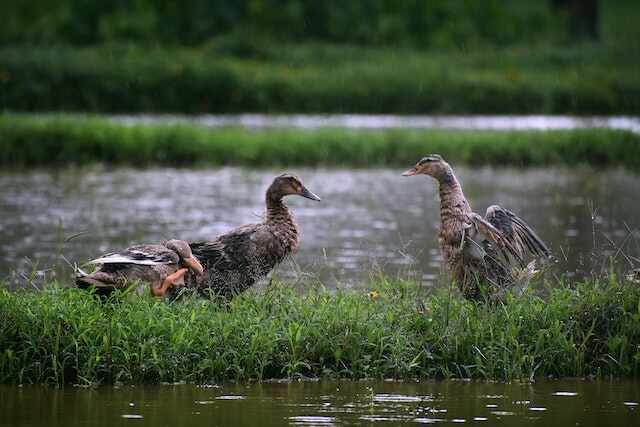
Tips for Managing Duck Waste
Minimizing Mess and Odors
Duck poop can be messy and smelly, but there are some simple steps you can take to minimize these issues.
One option is to place a layer of straw or other absorbent material in the bottom of your ducks’ pen. This will help soak up excess moisture and reduce odors.
You can also use a rake or other tool to regularly flip over wet spots and remove any visible droppings. Another way to reduce mess and odors is to provide your ducks with access to a pond or other body of water.
Ducks love water, and spending time in it can help them keep their feathers clean and healthy. Plus, if they spend enough time swimming, they may not need to poop as frequently on land.
If you’re still having trouble with mess and odors despite these precautions, you may want to consider using some type of odor control product.
There are a variety of products on the market designed specifically for managing animal waste, such as enzyme-based cleaners or absorbent powders.
Repurposing Duck Waste
Believe it or not, duck poop can actually be quite useful! One option is to compost it for use in your garden or on your farm.
Duck droppings are rich in nitrogen, phosphorus, and potassium – all essential nutrients for healthy plant growth.
To compost duck waste, simply pile it up in a designated area along with other organic matter such as leaves or straw.
Make sure the pile stays moist but not too wet (you don’t want it turning into a stinky mess!), and turn it over occasionally to aerate the contents. Another way to repurpose duck waste is by using it as fish food!
If you have an aquaponics system set up (where fish waste provides nutrients for growing plants), you can feed your fish with a small amount of duck poop.
Just make sure to use it sparingly, so you don’t overfeed the fish.
Cautions
While duck waste can be useful, it’s important to be cautious when handling it. Always wear gloves and wash your hands thoroughly after coming into contact with droppings or other waste material.
You should also avoid using fresh duck manure on plants that will be eaten within 90 days, as there is a risk of contamination from harmful bacteria such as E. coli.
Additionally, make sure to properly dispose of any excess waste material rather than simply dumping it in a nearby field or waterway.
Excessive buildup of animal waste can lead to nutrient pollution and other environmental problems.
Managing duck waste may not be the most glamorous aspect of owning or working with ducks, but it’s an important part of ensuring their health and happiness (not to mention keeping your living space clean!).
By following these tips for minimizing mess and odors, repurposing waste for gardening or farming purposes, and taking necessary precautions when handling droppings, you’ll be well on your way to managing duck poop like a pro!
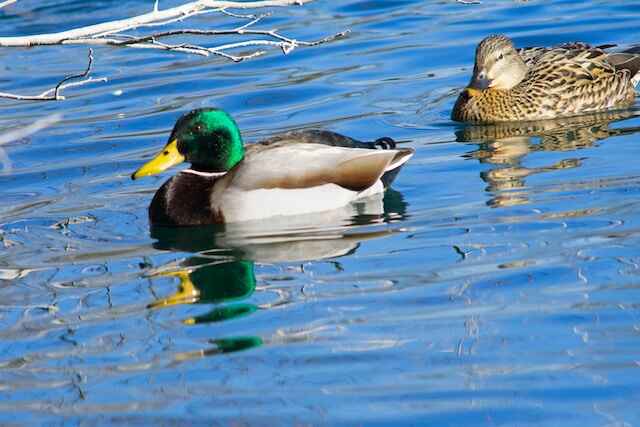
Fun Facts about Ducks and their Poop
Ducks are fascinating creatures, and even their poop has some intriguing features. Here are some fun facts you might not know about ducks’ digestive systems and bathroom habits.
Ducks Can Digest Certain Foods Humans Cannot
Ducks have a unique digestive system that allows them to break down and extract nutrients from foods that other animals, including humans, cannot.
They have a specialized compartment in their stomach called the proventriculus, which secretes digestive enzymes to help break down food.
Additionally, ducks have a gizzard that grinds up food with the help of small rocks they swallow.
This combination of unique organs allows ducks to digest tough materials like seeds and grains that humans would struggle to digest.
Duck Poop is Often Used as Fertilizer
While duck poop might seem like an unsightly mess to many people, it’s actually rich in important nutrients like nitrogen and phosphorus.
As such, farmers often use duck droppings as fertilizer for crops or garden plants.
Some enthusiasts even swear by “duckponics,” a method of growing plants using nutrient-rich water from duck ponds.
Ducks’ Poop Changes Depending on What They Eat
Like other animals, ducks’ feces can vary in appearance depending on what they’ve been eating.
If ducks consume lots of protein-rich foods like insects or fish, their droppings will be darker and may contain undigested bones or shells.
If they’re eating mostly vegetation or grains, their feces will be lighter with a smoother texture.
Duck Poop is an Important Part of Wetland Ecosystems
Wetlands are critical habitats for many species of wildlife, including ducks. Duck droppings play an important role in these ecosystems by providing nutrients for aquatic plants and phytoplankton.
This in turn supports a whole food web of organisms, from insects to fish to birds of prey. So, even though duck poop might not look pretty, it’s actually an essential part of maintaining healthy wetland ecosystems.
Duck poop may not be the most glamorous topic, but there’s more to it than meets the eye.
From their unique digestive system to their role in ecosystem health, ducks and their droppings are fascinating subjects for those who take the time to learn about them.
Conclusion: Cleaning up Duck Poop, One Quack at a Time
Duck poop is something that duck owners have to deal with on a regular basis. Understanding how often ducks poop and what their droppings look like is important for maintaining the health of your flock and keeping your coop or yard clean.
It’s also important for minimizing any potential risks associated with excessive buildup of waste. One key takeaway from this article is that ducks tend to poop more often than other domestic animals, such as chickens or cows.
On average, they can produce anywhere from 1-3 droppings per hour during the day. However, factors such as diet and activity level can affect frequency.
Another important point is that duck poop plays an important role in nutrient cycling and soil health.
While it may be unpleasant to deal with at times, it’s actually a valuable resource for gardeners and farmers who want to enrich their soil naturally.
If you’re a duck owner looking for tips on how to manage waste in your coop or yard, there are several strategies you can try.
For example, adding absorbent materials such as straw or wood shavings to the coop floor can help soak up excess moisture and reduce odors.
You can also try composting duck waste along with other organic matter like leaves or grass clippings.
While duck poop may not be the most glamorous topic out there, it’s an important one for anyone who owns or works with these birds.
By understanding how often ducks poop, what their droppings look like, and how to manage waste effectively, you can keep your flock healthy and your surroundings clean.
So next time you’re cleaning up after your feathered friends, remember that you’re also helping to create healthier soil and plants – not just getting rid of a mess!
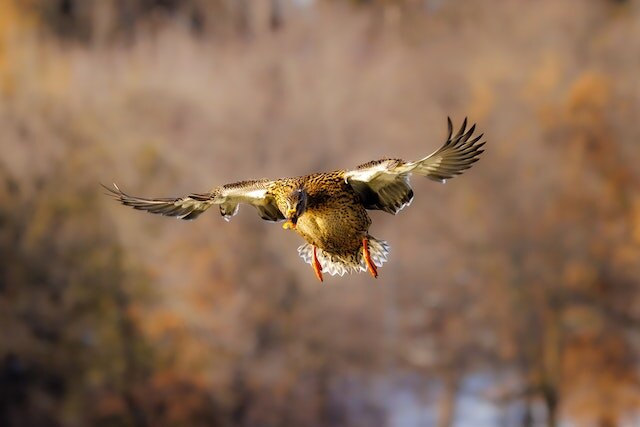
FAQs: How Often Do Ducks Poop?
How often do ducks poop?
Ducks poop frequently – as often as every 15-20 minutes, depending on their diet and water intake. They also tend to poop more often when they’re stressed or excited.
Is duck poop harmful?
Duck feces may contain dangerous bacteria such as E. coli and Salmonella, which can endanger human health. It is vital to note that exposure to duck droppings should be avoided, and if contact occurs, thorough handwashing with soap and water is necessary.
How do I clean up duck poop?
To clean up duck poop, use gloves and a plastic bag to pick up the poop, then dispose of it in a trash can. Use a disinfectant to clean the area where the poop was found.
Can I use duck poop as fertilizer?
Yes, duck poop can be used as fertilizer for plants. However, it should be composted first to reduce the risk of harmful bacteria.
How can I prevent ducks from pooping on my property?
To prevent ducks from pooping on your property, you can use visual deterrents such as fake predators or reflective surfaces. You can also try to make your property less attractive to ducks by removing sources of food and water.
How can I train my ducks to poop in a specific area?
It’s difficult to train ducks to poop in a specific area, but you can try to provide them with a designated area for food and water, which may encourage them to poop in that area as well.
How do I know if my ducks are healthy based on their poop?
Healthy duck poop should be firm and well-formed, with a greenish-brown color. If you notice any changes in your duck’s poop, such as diarrhea or blood, it may be a sign of illness and you should consult a veterinarian.
Can ducks get sick from their own poop?
Ducks can get sick from their own poop if they ingest it or come into contact with it. This is why it’s important to keep their living area clean and to avoid letting them swim in stagnant water.
How do I keep my pond clean from duck poop?
To keep your pond clean from duck poop, you can use a pond skimmer or net to remove any floating debris. You can also use beneficial bacteria or pond treatments to break down any organic matter in the water.
Can I eat duck eggs if the ducks are pooping in the same area?
It’s not recommended to eat duck eggs if the ducks are pooping in the same area, as the eggs may be contaminated with harmful bacteria. It’s important to keep the ducks’ living area clean and to collect the eggs frequently to reduce the risk of contamination.

